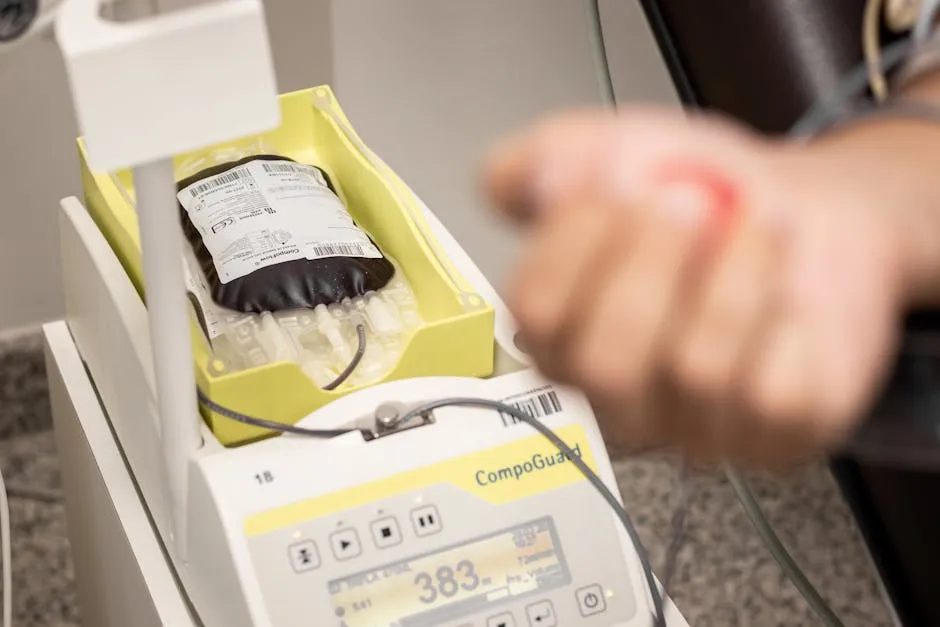
Why Shouldn’t You Donate Plasma?
Introduction
Plasma donation plays a vital role in healthcare. It helps create essential therapies for patients in need. Recently, more people are donating plasma for financial compensation. But is this trend a good idea? Let’s discuss some reasons why you might want to think twice before donating plasma.
Speaking of health, staying hydrated is crucial, especially if you decide to donate plasma. Consider investing in a Sports Water Bottle to keep your hydration levels up. It’s stylish, functional, and will remind you to sip throughout the day!

Summary and Overview
This article aims to shed light on why you should reconsider donating plasma. Many donation centers promote the benefits, like financial incentives and helping others. However, it’s crucial to look beyond the marketing. Potential downsides exist, including health risks, ethical concerns, and personal experiences from donors. By examining these aspects, you can make a more informed choice about plasma donation.
To keep your body in top shape for any donation process, check out the Health and Nutrition Books. They can guide you on how to maintain a balanced diet for optimal health, especially if you’re a frequent donor!
Health Risks Associated with Plasma Donation
Short-term Effects
Donating plasma can lead to temporary side effects. You might experience fatigue after plasma donation, dehydration, or dizziness. These effects occur as your body adjusts to the loss of plasma. According to studies, about 20% of donors report experiencing these adverse effects. It’s essential to stay hydrated before and after donating to mitigate dehydration risks. Eating a nutritious meal can also help prevent fatigue. Recognizing these potential side effects can help you make an informed decision about donating.
To combat fatigue and promote recovery, consider adding Electrolyte Powder to your post-donation hydration routine. It’s a magical mix that replenishes lost electrolytes faster than you can say “plasma!”
Long-term Consequences
Frequent plasma donation poses long-term health risks. One significant concern is anemia, which occurs when the body lacks enough healthy red blood cells. Regular donors may experience reduced immunity due to lower immunoglobulin levels. Research indicates that individuals donating plasma often have decreased levels of these crucial antibodies. This decline can leave you more vulnerable to infections. Acknowledging these long-term effects of plasma donation is vital for your health and well-being.
To help maintain your immune system, it might be wise to consider Multivitamins. They’re like a daily insurance policy for your health – especially important for those who donate plasma regularly!

Ethical Concerns
Exploitation of Donors
The compensation for plasma donation raises ethical issues. Many donors come from low-income backgrounds, relying on these payments for financial support. Literature, such as Blood Money, critiques the plasma donation industry for exploiting vulnerable populations. This practice blurs the line between altruism and financial desperation. It’s crucial to consider the ethical implications of compensating donors, as it can lead to a cycle of exploitation. Understanding these ethical issues in plasma donation helps frame the broader conversation about donor rights and welfare.
Transparency and Profit
When you donate plasma, it’s essential to know where that plasma goes. Plasma centers often sell it to pharmaceutical companies. These companies use plasma to create life-saving treatments, like immunoglobulins. However, the financial motives behind this process raise concerns.
In 2021, the U.S. plasma industry generated over $20 billion in revenue. That figure is projected to grow as demand for plasma therapies increases. This means that while donors receive compensation, large profits are made from their contributions. The average donor might earn around $50 to $60 per visit, while companies profit significantly more.

This disparity prompts questions about transparency in plasma use. Are donors fully aware of how their plasma is utilized? Understanding this profit-driven environment can help you make an informed decision about whether to donate.
Personal Experiences and Testimonials
Donor Accounts
Many donors share stories of negative experiences following plasma donation. Common themes emerge, illustrating potential health issues and feelings of exploitation. For instance, some report fatigue and dizziness after donating. One donor recounted fainting shortly after leaving the clinic, which raised concerns about safety protocols.
Others express feelings of being used for financial gain. They often describe their motivation to donate as financial necessity rather than altruism. Many donors, especially students, rely on these payments to cover living expenses. This context of economic pressure can overshadow the intended benefits of plasma donation, leading to a sense of exploitation.

Real-life donor experiences highlight the importance of weighing the risks against the benefits of plasma donation. And while you’re weighing those risks, don’t forget to consider your overall wellness. A First Aid Kit is a must-have for anyone, just in case you take a tumble after feeling faint!
Interviews with Healthcare Professionals
Healthcare professionals have varied perspectives on plasma donation. Many emphasize the importance of safety and proper eligibility screening. Dr. Kathy Puca, a senior medical director, notes that criteria for eligibility include age, weight, and overall health. These factors are essential to ensure donor safety.
However, some medical experts express concerns about the long-term health impacts of frequent donations. They warn that repeated donations can lead to low immunoglobulin levels. This decline can increase susceptibility to infections. Healthcare providers often recommend monitoring donor health, particularly for those donating more than once a month. To keep track of your health stats, a Fitness Tracker can be a fun and effective way to monitor your wellness journey!

Comparison with Other Forms of Donation
Blood Donation vs. Plasma Donation
When considering blood donation vs. plasma donation, frequency and health impacts differ significantly. Blood donation typically happens every eight weeks, while plasma can be donated up to twice a week. This higher frequency can lead to various health effects, including fatigue and dehydration.
Individuals in good health may opt for either donation type. Those with certain health issues, like anemia or low protein levels, might benefit from blood donation instead. Recognizing your health status is essential in making the right choice. While both donations are crucial, each has unique considerations for donors. If you’re on the go, consider meal prepping with Meal Prep Containers to ensure you have healthy meals ready to fuel your body!

Alternative Donation Options
If plasma donation isn’t right for you, there are alternative ways to contribute to healthcare. Volunteering at hospitals or health organizations can be incredibly rewarding. Financial contributions to blood banks or health charities also make a difference.
Currently, the need for blood and platelet donations is high. In fact, hospitals often face shortages, with blood donations needed every two seconds in the U.S. By exploring these alternatives, you can still support those in need without the potential risks associated with plasma donation.
Conclusion
In summary, plasma donation may not be suitable for everyone. Weigh the health risks and ethical concerns before deciding. Consulting with healthcare professionals can provide personalized advice tailored to your situation. Always prioritize your well-being when considering any form of donation. And remember, a little self-care goes a long way! Consider getting a Yoga Mat to help you unwind and relax after a donation session.
FAQs
Is donating plasma safe?
Donating plasma is generally safe when done at certified centers. Safety measures include a thorough health screening beforehand. Trained staff monitor vital signs and ensure proper techniques during the donation. Individual experiences may vary, with some reporting mild discomfort. Overall, many donors report feeling well and safe during and after the process.
What are the side effects of donating plasma?
Common side effects include fatigue, dehydration, and dizziness. Many donors experience these symptoms, especially after their first donation. Studies show that nearly 20% of donors report feeling fatigued post-donation. Staying hydrated and eating a nutritious meal can help reduce these effects. If you notice severe or persistent symptoms, consult a healthcare professional.
Can I donate plasma if I have health issues?
Certain health conditions may disqualify you from donating plasma. High blood pressure, diabetes, and chronic illnesses like HIV or hepatitis can prevent eligibility. Additionally, recent surgeries or infections may lead to temporary deferrals. Always consult with a healthcare provider if you’re unsure about your eligibility.
How often can I donate plasma?
Most donation centers allow plasma donation twice a week, provided at least 48 hours have passed since your last donation. However, the American Red Cross recommends waiting 28 days between donations. This helps ensure your body has enough time to recover and replenish plasma levels.
What happens to the plasma after donation?
After donation, plasma is sent to pharmaceutical companies for processing. It’s purified and used to create vital medications, such as immunoglobulins. The entire process, from donation to treatment, can take several months. Understanding this helps you appreciate the significant impact of your donation on patients’ lives.
Are there any financial incentives for donating plasma?
Yes, many centers offer compensation for plasma donations. First-time donors can earn around $50, with subsequent donations earning approximately $60 each. However, ethical concerns exist regarding this practice, as it may exploit low-income individuals. It’s essential to weigh the financial benefits against potential health risks.
What should I know before donating plasma?
Before donating plasma, consider these key points: ensure you’re in good health, stay hydrated, and eat a balanced meal before your appointment. Review any medications that might affect your eligibility. Additionally, be aware of potential side effects and how they may impact you. Being informed helps you make the best decision for your health.
Please let us know what you think about our content by leaving a comment down below!
Thank you for reading till here 🙂 And if you’re looking for something fun to do after all this serious talk, why not check out some Fun Board Games to lighten the mood? You deserve a break!
All images from Pexels




